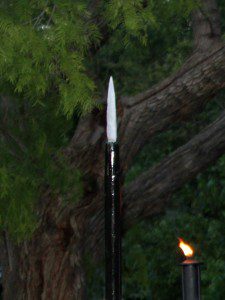Ask a modern Druid “what is Druidry?” and you’re likely to get an answer filled with bright, positive imagery. I’m fond of the phrase “Druidry is the art of wild wisdom.” I’ll also give a three-part answer (Druids love threes!) “a Druid is a storyteller and a keeper of lore, a seer and a keeper of wisdom, and a priest of Nature and the Gods of Nature.”
Because we know so little about the ancient Druids, they have long been a blank slate onto whom people could project whatever qualities they found desirable. The Druid Revival began about the same time as the attempt to preserve and promote Celtic culture and the abuses of the Industrial Revolution that caused people to start thinking romantically about Nature. So it’s no surprise Druidry is usually associated with Celtic culture and with Nature.
Druids are poets, songwriters, and storytellers. Druids plant gardens and protest fracking. It is not the Lorax but the Druids who speak for the trees.
If anyone brings up some of the nastier things that have been associated with Druids, we accuse them of reading Julius Caesar’s propaganda. And who knows – we might be right. The evidence that the Druids practiced human sacrifice is inconclusive, and even if they did they still can’t compare with the Romans for cruelty and brutality.
We want our Druidry to be light and peaceful and nice… something that won’t scare our Christian and atheist neighbors.
Yet there are times we can’t be nice. How can we be nice in the face of environmental destruction? How can we be nice in the face of injustice and the abuse of power? How can we be nice in the face of oppression? How can we be nice in the face of criminal threats?
Reasonable? Absolutely. Compassionate? Definitely. Nice and light? Not always.
Before the Battle of Magh Tuireadh, Figol the Druid was asked what he would do. He said:
I will cause three showers of fire to pour on the faces of the army of the Fomor, and I will take from them two-thirds of their bravery and their strength, and I will put sickness on their bodies, and on the bodies of their horses.
But as to the men of Ireland, every breath they breathe will be an increase of strength and of bravery to them; and if they are seven years in the battle they will never be any way tired.
Read the stories of our Celtic ancestors. When fighting was necessary they were led by great warriors, men and women skilled in weapons and combat, possessing great strength and endurance, and most of all, the determination to succeed. It is very appropriate that Lady Gregory’s translation was titled Gods and Fighting Men.
But where you find Celts in battle you will usually find Druids as well. Not as sword-swinging combatants, but as magical and inspirational supporters. Figol rains fire on the Fomorians, steals their strength and weakens both the enemy fighters and their horses. And he blesses his own fighters.
In other stories we read of Druids singing spells, calling mists, and turning both friends and foes into different animals. They cast spells of forgetfulness and weakness, and sometimes, spells of death.
Druids show up to support their fighters in one of the few historical records we have of them. Writing about the Roman massacre on Anglesey in 61 CE, the historian Tacitus said:
On the beach stood the adverse array, a serried mass of arms and men, with women flitting between the ranks. In the style of Furies, in robes of deathly black and with dishevelled hair, they brandished their torches; while a circle of Druids, lifting their hands to heaven and showering imprecations, struck the troops with such an awe at the extraordinary spectacle that, as though their limbs were paralysed, they exposed their bodies to wounds without an attempt at movement.
The Druids ultimately lost that battle. Magic has limits. But this account tells us that whether Figol’s dark Druidry was historical or mythical, it was not fictional. Our ancestral Druids fought for their tribes and their homes by doing what they did best.
So what does this mean to us here and now?
The majority of us in the West do not face the kind of threats our Iron Age ancestors faced. Our threats are more subtle (most of the time), but that only makes them harder to recognize and harder to confront. But do not doubt we face threats every bit as real as Fomorian or Roman armies: climate change, resource depletion, plutocracy, patriarchy, militarization of the police, terrorists and those who exploit terrorism for political gain… not to mention the occasional individual who would cause us harm for personal gain or for no reason at all.
How do we respond to these threats? Some are called to be activists and radicals. I admire their work, but it’s not work I can do, any more than I can carry a spear in the front lines against the legions (which is to say it’s possible but it would not be effective and it would not end well).
But I can do what the ancient Druids did. I can encourage those who are fighting the battles. I can support them physically, spiritually, emotionally, and financially.
 I can be a Nature-loving presence in a Nature-exploiting world. I can raise awareness, but raising awareness is an overrated (or at least, overused) tactic. Thinking good thoughts is nice, but it only helps if those good thoughts turn into good actions. Bardic work can help people of good will to wake up and start doing something.
I can be a Nature-loving presence in a Nature-exploiting world. I can raise awareness, but raising awareness is an overrated (or at least, overused) tactic. Thinking good thoughts is nice, but it only helps if those good thoughts turn into good actions. Bardic work can help people of good will to wake up and start doing something.
I can’t rain fire down on my enemies, but if you think that means magic is useless you haven’t been paying attention to one of the core messages of this blog.
Our friends the Witches have a saying “a Witch who cannot hex cannot heal.” Victor Anderson, co-founder of the Feri tradition, said “White magic is poetry. Black magic is anything that actually works.”
There is a dark side to Druidry, a side that’s not about hugging trees and telling Irish stories. It’s a side many modern Druids prefer to ignore in their practices and actively deny to the non-Pagan world. The dark side of Druidry is scary, it can be dangerous, and it carries more responsibility than many of us prefer to accept.
But it is as much a part of our heritage as plant lore and poetry. And in this world full of threats, abuses, and injustices, it’s one more thing.
It’s necessary.
















